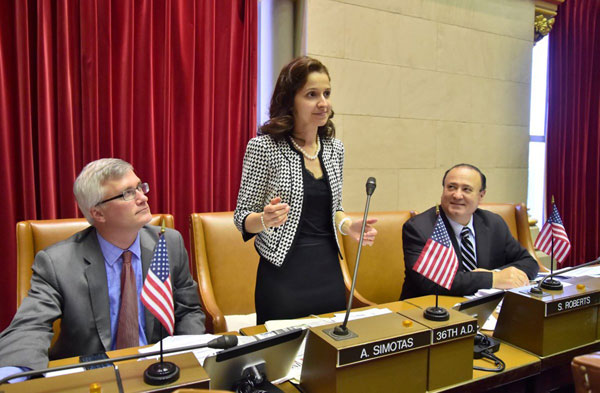By Bill Parry
A package of four bills to help small businesses avoid common violations and increase transparency and public participation in agency rulemaking has passed in both houses of the state Legislature.
The bills will now be sent to Gov. Andrew Cuomo to be signed into law. All four measures were sponsored by state Assemblywoman Aravella Simotas (D-Astoria), chairwoman of the Administrative Regulations Review Commission, she announced Tuesday after the Senate passed the fourth and final measure.
The legislation would help New York’s small and independent businesses by making it easier for them to comply with regulations and avoid common violations.
“As the daughter of a small business owner, I know first-hand how vital small businesses are to the economic health of our communities and our state,” Simotas said. “My bills will help create a healthier environment in New York for small businesses and to ensure that regulatory agencies are more user-friendly.”
One piece of the legislation helps small businesses to comply with regulations by requiring state agencies to create plain language regulation guides that would include information on the most common regulatory violations that small businesses are cited for by the agency. It will also list actions that small businesses can take to minimize or prevent the occurrence of violations. In addition, the bill authorizes the Empire State Development’s Division of Small Businesses to monitor agency enforcement actions against small businesses to prevent the misuse of enforcement quotas and monetary penalties as a revenue stream.
“Education and better communication through small business guides will improve compliance with necessary regulation to ensure public health and safety without hurting the health or strangling the growth of businesses,” Simotas said.
A second bill to make business and public participation in government rule making easier extends to a minimum of 60 days the time to review and comment on proposed rules. Currently, 45 days is the current mandate for many state agencies.
Simotas’ third bill, the Electronic Distribution of Rule Making Information Act, is a long-overdue remedy that will bring agency rule making into the 21st century and make it easier for the public to follow agency actions, she said.
An agency now is only required to “snail mail” rule-making notices to people or companies who send them a written request and the written request has to be renewed each year. The Simotas bill will allow the public to make email requests for rule-making notices, to narrow their request to specific divisions or programs of an agency while an electronic request would stay in effect until the person submitted a request to discontinue notification. The agencies, in turn, would send rule-making notices electronically rather than by snail mail without charge.
The fourth Simotas bill in the package requires agencies that propose new rules to actively solicit input from those affected and to access the impacts, taking into account the “practical, legal and economic or fiscal constraints” that may affect the ability of small businesses or local governments to implement new regulatory requirements.
“Public agencies need to hear the voices of the people when they are making rules that affect so many aspects of our lives, our livelihoods and the communities we live in,” Simotas said. “Until now, those voices have been dampened and even silenced by mid-20th century communication, which this bill rectifies.”
Reach reporter Bill Parry by e-mail at bparr




































